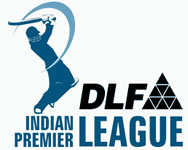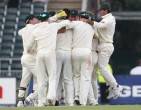Growing Unrest
Corey Taylor |
Brewing Unrest
For the past few months, attention within the cricketing world has been predominantly directed towards the Indian Premier League Tournament (IPL) about to begin within India. The existence of the tournament itself has caused much debate within all cricketing circles and without giving the tournament its blessing, respective cricketing boards have not prevented players from signing with teams with the exception of the English Cricket Board (ECB) who refused to sign any No Objection Certificates (NOC`s) for their players. Concerns raised by boards over player availability for officially sanctioned representative tours have been mollified for the moment as IPL teams have allowed players with pending tours to leave part-way through the tournament. That concerns raised by boards have apparently been motivated by sponsorship issues relating to official tours, rather than the issue of player burnout, has raised the ire of players and associations. A perception amongst players which is has been gaining pace for many years is that boards don`t understand the players` concerns nor are they terribly interested in hearing them. A growing back-catalogue of comment by players in the mainstream media suggests players are growing weary of the notion that employment by their board also assumes their career is controlled by same.
Similarly, the players are growing disenchanted with the International Cricket Council (ICC). The ICC`s 10-year-plan did not appear to allow for the IPL and there have been many disputes regarding the ICC`s inflexibility which have aggravated the already tense situation regarding player burnout. Players have said they are suffering under the weight of playing against every Test nation in various Test, limited overs and Twenty20 fixtures and have claimed the rate of wear-and-tear injuries as well as emotional/mental/filial strain is unsustainable. The lucrative IPL has thrown that assertion into doubt in the eyes of the ICC as it would appear that players who commit to a month-long tournament for money whilst claiming burnout are perhaps not as affected by the ICC`s schedule as they would claim. The players have counter-claimed stating that a Twenty20 tournament is not as taxing as other ICC-sanctioned commitments and that rather than trying to fit it in, the ICC should clear the schedule for that period of time every year to allow players to fulfil both ICC and IPL-related commitments.
Even then, this is only with respect to the players who currently command Test spots with their countries. Players who are on the fringes of Test selection or several rungs below resent the fact they are contractually-bound to play only for their state/county and cannot maximise their income by signing for an IPL team or the rival Indian Cricket League competition. Additionally, the issue of personal sponsorship continues to simmer amongst players, particularly those from sub-continental teams. The perception is that players should not be preventing from maximising their income and market value by entities that don`t appear to have their best interests at heart.
The above issues are the most far-reaching amongst players but there are more which are adding to player dissatisfaction with official powers. The indirect consequence of the IPL situation is that players feel they should be in control of their careers and welfare and that their boards and the ICC don`t have their individual needs at heart as much as they should. Related to that is the notion that the ICC`s administration of issues such as sledging aren`t taken seriously enough and put players` careers in jeopardy because of it. The role of a match referee as sole arbiter of disputes within a match has been called into question by the Symonds/Harbhajan confrontation during the recent Sydney Test match and many players feel that independent arbitration by a legal official, such as what occurred in the aftermath of that match, is the method by which both rules and the welfare of players are most likely to be respected. As it stands, the match referee`s role remains in place and there is likely to be vigorous debate regarding this at the next ICC AGM. Additionally, there was a player`s survey after the 2007 World Cup final and approximately 56% of players expressed dissatisfaction with the ICC`s handling of organisation. Clearly, players are not happy with either their home boards or the ICC and do not believe either parties are in the best position to decide the course of their careers.
The overarching consequence of these events would appear to be that players are seriously considering taking matters into their own hands. Yesterday, Tim May, chief executive of the Federation of International Cricketers (FICA), sought to distance himself from comments made by Ian Smith, the association`s legal adviser, that players were set to pass a vote of no-confidence in the ICC as ruling body of the game. “..competence of the administrators is being called into question at a policy level. We believe that because the players are better organised and that talent has been radically revalued by the Indian leagues it`s time to look at whether the players can do a better job than the current policy makers.” Several weeks ago, Tim May himself charged players` respective boards with anti-competitive behaviour regarding the Indian cricket leagues and warned that players and the association will vigorously defend their rights with respect to unreasonably impeding their employment rights.
It is abundantly clear that a creative response to this problem is warranted by the ICC because the players are unsatisfied with their and associated countries` boards attitude towards their income and playing futures. Further aggravating the players is the inference that they are lacking in loyalty to their home boards by signing with these alternative cricketing leagues. A combination of lacking control over their professional lives with diminishing faith in those charged to do so threatens to force the hands of players into choosing career over country and this is an unacceptable situation to place anyone in. The players believe not only that a solution in which all parties are satisfied is possible but that those they are negotiating with aren`t being flexible enough to push for it for little more than monetary reasons and it`s difficult to argue otherwise as public comment from boards supports this. There is an uncomfortable tension between players and administrators and if the IPL is the success most expect it will be, the position of players will be strengthened. How the ICC and country boards deal with this will be a marker of maturity towards the careers of players and acceptance of market forces which impact on their core business whether they like it or not.





Leave a comment